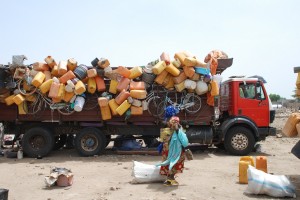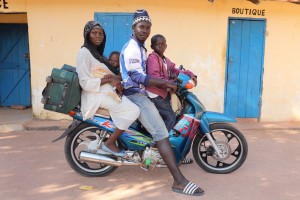Côte d’Ivoire to host a decisive UNHCR / ECOWAS Conference to end statelessness in West Africa
ECOWAS Member States are expected to adopt a Declaration on the prevention, reduction and elimination of statelessness by the end of the meeting. At least 750,000 people are stateless or at risk of statelessness in the region.
ABIDJAN, CÔTE D’IVOIRE, 24 February 2015 (UNHCR) – UNHCR and the Economic Community of West African States (ECOWAS) are holding this week a ministerial conference to end statelessness in West Africa – the first of its kind on the African continent. The event takes place tomorrow (25 February) in Abidjan, Côte d’Ivoire, and aims at finding regional solutions to prevent, reduce and ultimately eliminate statelessness in the sub-region.
It is preceded on 23 and 24 February by two days of high-level level technical debates among experts in the field of nationality and statelessness.
More than 750,000 people do not have a nationality or are at risk of becoming stateless in West Africa. “These are estimates, however, mostly based on figures released by Côte d’Ivoire” says Emmanuelle Mitte, UNHCR expert on statelessness in West Africa. “As other countries do not yet have mechanisms in place to capture data on statelessness, the information for West Africa is not complete, but the problem persists. We believe that statelessness could affect hundreds of thousands more in the region”.
Statelessness can be caused by ineffective civil registration: when children are not registered at birth, they may be left unable to establish their nationality. In some countries, women cannot pass on their nationality to their children, or there are discriminatory criteria on the basis of race or ethnicity that prevent certain groups from acquiring or transmitting nationality. The lack of safeguards in nationality laws against statelessness at birth or later in life and the impracticability of some naturalization procedures compound the phenomenon. These problems are exacerbated in the context of significant migration flows in West Africa.
Other groups that are stateless or at risk thereof in West Africa include former refugees and stranded migrants of Liberian origin throughout the region; some people of Mauritanian origin in exile in Mali and Senegal; undocumented children, such as street children in Senegal, who cannot prove their parents’ identity; and the people living in a legal limbo on disputed territories such as the Ile des Oiseaux between Benin and Niger, or the Bakassi peninsula between Nigeria and Cameroon, to name a few.
 UNHCR / HELENE CAUX
UNHCR / HELENE CAUXMohamed, 17, sits in front on his house in the small village of Saria, central Côte d’Ivoire. He was born in Ouagadougou, Burkina Faso, to Burkinabè parents who passed away when he was very young. His mother’s older brother brought him to Côte d’Ivoire shortly after their death, and he has never returned to his birth village since settling in Saria. He was not declared at birth and has no papers to prove his parents’ Burkinabè nationality. He has resigned himself to never leaving Saria because of lack of papers. “When I tried to travel to neighbouring towns to sell my cocoa or coffee harvests, policemen or military stopped me and sometimes forced me to pay 10,000 West African francs (around 20USD), which is half of my annual wages”.
Bereft of a nationality, stateless people are denied a range of fundamental human rights. They are often unable to obtain identity documents; they may be detained simply because they do not have any proof of nationality. “They are unable to travel or get married, and can be denied access to education and health services”, explains Mark Manly, Head of the UNHCR statelessness unit in Geneva, who is attending the Conference in Abidjan. “Finding a job is often impossible, as is buying and selling land or borrowing money to start a business. Stateless people are vulnerable to exploitation and abuse, and they cannot easily seek protection and justice as they are invisible in the eyes of the law”. The psychological impact of being without a nationality is also significant: stateless people feel as if they do not exist. Their civil and political rights are denied, leaving them unable to fully participate in the everyday life of their communities.
The Conference will be opened by President Alassane Ouattara of Côte d’Ivoire, and UNHCR High Commissioner for Refugees António Guterres will deliver a keynote address. Ministers from the ECOWAS States and representatives of regional and international organizations including the African Union, the Organization of the Islamic Conference, the Commonwealth and the Mano River Union will also attend. UNHCR’s Lifetime Goodwill Ambassador Barbara Hendricks and Ivoirian artist A’salfo will share the stories of stateless people they met and will advocate for greater public awareness of this too often under-reported issue.
The objective of the Conference is to promote a comprehensive West Africa regional strategy to identify stateless people and to put in place measures to prevent and reduce statelessness, as part of UNHCR’s global campaign to eradicate statelessness by 2024.
ECOWAS Member States are expected to adopt a Declaration on the Prevention, Reduction and Elimination of Statelessness and on the Protection of Stateless People at the end of the Conference.
Nine West African States have acceded to the 1954 Convention relating to the Status of Stateless Persons and eight have acceded to the 1961 Convention on the Reduction of Statelessness, including seven in the past four years. Côte d’Ivoire and Senegal have already taken important measures to reform their nationality laws in accordance with these instruments and other standards of international human rights law.
For more information:
http://unhcr.org/ecowas2015
http://kora.unhcr.org
http://ibelong.unhcr.org
La Côte d'Ivoire accueille une Conférence du HCR et de la CEDEAO de haut niveau pour mettre fin à l'apatridie en Afrique de l'Ouest
Les États membres de la CEDEAO devraient adopter une Déclaration sur la Prévention, la Réduction et l'Elimination de l'Apatridie à la fin de la réunion. Au moins 750.000 personnes sont apatrides ou à risque d’apatridie en Afrique de l’Ouest.
ABIDJAN, CÔTE D’IVOIRE, 24 février 2015 (HCR) - Le HCR et la Communauté économique des Etats de l'Afrique de l'Ouest (CEDEAO) organisent une conférence ministérielle pour éliminer l'apatridie en Afrique de l'Ouest. C’est la première conférence sur l’apatridie jamais organisée sur le continent africain. L'événement débutera demain (25 février) à Abidjan en Côte d'Ivoire. Il vise à trouver des solutions au niveau régional pour prévenir, réduire et éliminer l'apatridie en Afrique de l'Ouest.
Plus de 750 000 personnes n’ont aucune nationalité ou risquent de devenir apatrides en Afrique de l'Ouest. « Ces estimations sont, pour la plupart, fondées sur des statistiques publiés par la Côte d'Ivoire » précise Emmanuelle Mitte, l’experte du HCR sur l’apatridie en Afrique de l’Ouest. « Comme les autres pays ne sont pas encore dotés de mécanismes pour recueillir des statistiques sur l'apatridie, l'information pour l'Afrique de l'Ouest n’est pas complète, mais le problème persiste. Au HCR, nous pensons que l'apatridie pourrait affecter des centaines de milliers d'autres personnes à travers toute la région » .
L'apatridie peut être causée par un service d’état civil inefficace et quand les enfants ne sont pas enregistrés à la naissance, ce qui peut les empêcher d'établir leur nationalité. Dans certains pays, les femmes ne peuvent pas transmettre leur nationalité à leurs enfants. Par ailleurs, il y a des critères discriminatoires sur la race ou l'origine ethnique qui empêchent certains groupes d’obtenir ou de transmettre la nationalité. L'absence de garanties, dans les lois sur la nationalité, contre l'apatridie à la naissance ou plus tard dans la vie ainsi que des difficultés dans certaines procédures de naturalisation aggravent ce phénomène. Ces problèmes sont exacerbés dans le contexte des flux de migration importants en Afrique de l’Ouest.
Parmi d'autres personnes apatrides, ou qui risquent de l’être en Afrique de l'Ouest, il y a d'anciens réfugiés et des migrants d'origine libérienne qui sont bloqués dans la région ; des personnes d'origine mauritanienne en exil au Mali ou au Sénégal ; des enfants sans papiers, comme les enfants des rues au Sénégal qui ne peuvent prouver l'identité de leurs parents ; et des personnes vivant dans un vide juridique sur des territoires contestés comme l'Ile des Oiseaux entre le Bénin et le Niger, ou la péninsule de Bakassi entre le Nigéria et le Cameroun.
Dépourvus de nationalité, les apatrides ne peuvent exercer nombre de droits humains fondamentaux. Souvent, ils ne peuvent obtenir aucun document d'identité ; ils peuvent être détenus simplement car ils ne sont détenteurs d’aucune preuve de nationalité. « Ils sont dans l’incapacité de voyager ou de se marier » explique Mark Manly, chef de l’unité apatridie au HCR a Genève et qui est présent à la conférence d’Abidjan. Ils peuvent se voir refuser l'accès à des services éducatifs et de santé. Trouver un emploi leur est souvent impossible, ainsi qu'acheter et vendre des terrains ou emprunter de l'argent pour démarrer une entreprise. Vulnérables à l'exploitation et aux abus, les apatrides ont des besoins non satisfaits en matière de protection et de justice car ils sont invisibles par rapport à la loi. L'impact psychologique de la vie sans nationalité est également significatif : les apatrides ressentent qu’ils n’existent pas. Leurs droits civils et politiques sont niés et ils ne peuvent pas non plus participer pleinement à la vie quotidienne de leurs communautés.
La Conférence sera ouverte par le Président de la Côte d'Ivoire Alassane Ouattara et le Haut Commissaire pour les Réfugiés António Guterres prononcera un discours d’ouverture. Des Ministres des Etats de la CEDEAO et des représentants d’organisations régionales et internationales, y compris l'Union africaine, l'Organisation de la Conférence islamique, le Commonwealth et l'Union du fleuve Mano, seront également présents. L’Ambassadrice de bonne volonté à vie du HCR Barbara Hendricks et l'artiste ivoirien A'salfo témoigneront de la vie de personnes apatrides qu'ils ont rencontrées et plaideront pour une plus importante sensibilisation du public sur ce problème trop souvent passé sous silence.
L'objectif de la Conférence est de promouvoir une stratégie régionale pour toute l’Afrique de l'Ouest afin d’identifier les personnes apatrides et d’établir des mesures pour prévenir et réduire l'apatridie, dans le cadre de la campagne mondiale du HCR pour éliminer l'apatridie d’ici 2024.
Les États membres de la CEDEAO devraient adopter une Déclaration sur la Prévention, la Réduction et l'Elimination de l'Apatridie ainsi que sur la Protection des apatrides à la fin de la Conférence. Neuf Etats de l'Afrique de l'Ouest ont adhéré à la Convention de 1954 relative au statut des apatrides et huit ont adhéré à la Convention de 1961 sur la réduction des cas d'apatridie, dont sept ces quatre dernières années.
Pour davantage d'informations, veuillez consulter :
http://unhcr.org/ecowas2015
http://kora.unhcr.org
http://ibelong.unhcr.org



















